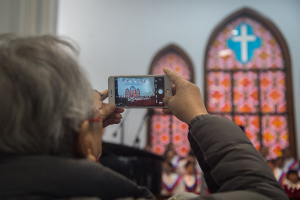Senators launch investigation as leaked internal data shows Instagram can be harmful for teens

Members of the U.S. Senate have vowed to investigate Instagram's negative impact on the self-esteem of young users after a recent report showed that the platform's parent company, Facebook, knew but didn't disclose how the image-sharing platform is harmful to teen users.
On Tuesday, Sens. Richard Blumenthal, D-Conn., and Marsha Blackburn, R-Tenn., the chair and ranking member of the Senate Subcommittee on Consumer Protection, Product Safety, and Data Security, announced intent to launch a bipartisan probe into Facebook’s knowledge of its platforms’ negative impact on teenagers. The probe is expected to begin next month.
The announcement comes days after a Wall Street Journal report revealed that an internal study launched by the social media giant found that one out of three teenage girls who used Instagram say the platform made them feel worse about their bodies. The leaked study also found that among teens who reported suicidal thoughts, "13% of British users and 6% of American users traced the desire to kill themselves to Instagram."
“It is clear that Facebook is incapable of holding itself accountable. The Wall Street Journal’s reporting reveals Facebook’s leadership to be focused on a growth-at-all-costs mindset that valued profits over the health and lives of children and teens," the senators stressed in a joint statement.
"When given the opportunity to come clean to us about their knowledge of Instagram’s impact on young users, Facebook provided evasive answers that were misleading and covered up clear evidence of significant harm. We are in touch with a Facebook whistleblower and will use every resource at our disposal to investigate what Facebook knew and when they knew it — including seeking further documents and pursuing witness testimony. The Wall Street Journal’s blockbuster reporting may only be the tip of the iceberg.”
Last month, Blumenthal and Blackburn called on Facebook to release its internal research on the potentially harmful impacts of its platforms on mental health and how the data has been used for marketing its products to young users.
Blumenthal and Blackburn held a hearing in May focusing on how to protect children online as the amount of time children spend on popular social media apps has surged.
On Wednesday, Sens. Edward Markey, D-Mass, along with Reps. Kathy Castor, D-Fla., and Lori Trahan, D-Mass., wrote Facebook CEO Mark Zuckerberg to demand answers in light of the Wall Street Journal report. They called on Facebook to abandon plans to develop an Instagram platform for kids under 13.
"Children and teens are uniquely vulnerable populations online, and these findings paint a clear and devastating picture of Instagram as an app that poses significant threats to young people’s wellbeing," the lawmakers wrote in their Sept. 15 letter. "As the internet — and social media specifically — becomes increasingly engrained in children and teens’ lives, we are deeply concerned that your company continues to fail in its obligation to protect young users and has yet to commit to halt its plans to launch new platforms targeting children and teens."
"The recently uncovered evidence published in the Wall Street Journal underscores Facebook’s responsibility to fundamentally change its approach to engaging
with children and teens online," they added. "That starts with Facebook abandoning its plans to launch a new version of Instagram for kids."
The Wall Street Journal reports that researchers from Facebook discovered that 32% of teen girls said that when they felt bad about their bodies, Instagram made them feel worse. Out of 1 billion Instagram users, 22 million teen logins occur per day.
“Comparisons on Instagram can change how young women view and describe themselves,” said researchers in a March 2020 slide presentation posted to Facebook’s internal message board, according to the newspaper.
Findings displayed in the presentation also revealed that teens blame Instagram for increases in the rate of anxiety and depression.
Anastasia Vlasova, a teenager in Virginia, told The Wall Street Journal that she started to see a therapist because she developed an eating disorder, which she believed developed due to viewing Instagram content.
“When I went on Instagram, all I saw were images of chiseled bodies, perfect abs and women doing 100 burpees in 10 minutes,” she said.
The negative impact social media can have on mental health is well-documented.
Child Mind Institute research found that increased time on social media can cause teenagers to feel more isolated, which could be linked to pre-existing feelings of loneliness. Theories suggest that social media is not helpful and can potentially be harmful to teenagers’ self-esteem.
“Seeing lots of perfect pictures online might make kids (especially girls) view themselves negatively [and] feeling bad about themselves can lead to depression,” the Child Mind Institute study states.
“The less you are connected with human beings in a deep, empathic way, the less you’re really getting the benefits of a social interaction,” Alexandra Hamlet, a clinical psychologist, told researchers. “The more superficial it is, the less likely it’s going to cause you to feel connected, which is something we all need.”
In May 2021, an option was rolled out on Facebook and Instagram so that users can hide the number of “likes” generated from each post.
Now, Facebook is being accused of keeping its internal studies secret from the public. In May, Instagram head Adam Mosseri told reporters that he had seen research revealing the app’s effects on teen wellbeing is likely “quite small,” according to The Wall Street Journal report.
“The hope here was to try and depressurize the experience a little bit,” Mosseri told the reporters on a press call. “It turned out that it didn’t actually change nearly as much about the experience in terms of how people felt or how much they use the experience as we thought it would.”
Tony Souder, head of the Chattanooga-based Pray for Me Campaign, a Church-wide initiative that equips adult believers to pray for children and students, told The Christian Post that today’s teens are being “discipled by their phones.”
“As a Church, we have to be able to think differently and help them differently than we ever even imagined,” he said. “The Church has to come alongside young people in a different way. If we don’t do something different, we’re going to miss an entire generation. We have to create intergenerational relationships so they will have the resources they need to flourish in faith and life.”



























